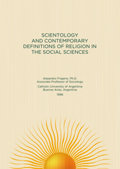The substantive definitions of religion intend to characterize it in accordance with the intrinsic traits which the religious experiences have for those who practice it. Defined as religious from this perspective are those experiences which individuals perceive as extraordinary, transcendent and clearly different from the quotidian reality which is perceived the majority of the time. Those who have such experiences cannot explain them through the concepts and theories which are normally used to define and explain the events of their lives. Experience in these circumstances, however, appears to them as undeniable, more real than that which is perceived in the everyday world. Peter Berger says:
“In the context of religious experience, the reality of daily life loses in dramatic form its status as supreme reality. It appears, to the contrary, as the anteroom of another reality, one of a drastically different nature and nevertheless of immense importance for the individual. Through this change in this perception of reality all worldly activity of quotidian reality is seen as radically reduced in importance, trivialized—in the words of Ecclesiastes, reduced to vanity.” (Berger 1974, 130–131)
From this viewpoint, religion is defined as the kingdom of the extraordinary, the sacred, “the other.” In other words, religion is the sphere of activity and human thought which draws in turn on experiences which put the individual in contact with something inexplicable, marvelous, mysterious and majestic which cannot be explained through the rationality and theories through which one is aware of the events of his life. Religious institutions are those which act to regularize, define and explain religious experiences.
To ask oneself if Scientology fits the existing definitions of religions is the equivalent of investigating if it revolves around, regulates or explains some type of extraordinary experience which puts the individual in contact with a reality of another order, marvelous and surprising. The answer is, according to my understanding, affirmative.
Beyond the resolution of problems and the accomplishment of quotidian objectives, the road of Scientology promises, to one who applies himself to the understanding of its practices, gradual advancement to a lasting happiness and new states of consciousness never dreamed possible. The culmination of such states of consciousness constitutes an experience of total freedom in which the individual would have the capacity to control the physical universe, composed of matter, energy, space and time, and reach a total omniscience. The awareness of life and death and awareness of the universe would therefore be clearly evident to one. The Church of Scientology states:
“Man consists of three parts: the body, little more than a machine; the mind divided into analytical and reactive, which computes and contains little more than a collection of pictures; and the thetan, life itself, the spirit which animates the body. … The point being, the thetan is superior to both body and mind. … But what are his limits? How high can he ultimately ascend?
“From the search for these answers came the subject of Scientology, and the door opened to the full realization of spiritual potential.
“That state is called Operating Thetan… Although without mass, motion, wavelength or location in space or time, the thetan is nonetheless capable of accomplishing anything. Thus, the Operating Thetan or OT may be defined as one who is at ‘knowing and willing cause over life, thought, matter, energy, space and time.’
“It is not for nothing, then, that Scientology has been described as realizing man’s most basic hope for spiritual freedom—by stripping away the accumulated impediments of the ages and returning to our native state, with all the abilities that are inherently ours.” (The Scientology Handbook, page lxxxv.)
A publication of the Church describes in the following manner the results that can be obtained by reaching the ultimate level of Operating Thetan:
“These truths are essential to your survival as an OT and your ability to achieve total spiritual freedom. Your concepts of time, the future and the past suddenly shift and you will experience an incomparable new level of stability and knowingness that will stay with you for this and future lifetimes.” (Source Magazine 99:21)
The difference between this experience of freedom and omniscience on the one hand and the common experience of man is clear. Furthermore, the doctrine of Scientology holds that he who follows the road it has laid out can achieve the experience of “exteriorization” in which the thetan (spirit) leaves the body and exists in a form independent of the flesh. Upon exteriorization the person would be able to see without the eyes of the body, hear without ears, and feel without hands, achieving the certainty that he is himself (the thetan) and not his body. According to Scientology, exteriorization of the thetan makes it obvious that the spirit is immortal and is endowed with abilities which exceed those which one could predict through quotidian reasoning:
“The thetan is able to leave the body and exist independent of the flesh. Exteriorized, the person can see without the body’s eyes, hear without the body’s ears and feel without the body’s hands. Man previously had very little understanding of this detachment from his mind and body. With the act of exteriorization attainable in Scientology a person gains the certainty he is himself and not his body.” (What Is Scientology? 1992:147)
Scientology fits the substantive definitions of religion in use in the social sciences at the present time.
In summary, like the large number of religions which internationally constitute the “religious ferment” of the last several decades (the religions of Eastern origin, Pentecostalism and the Afro-American religions, among others) religious experiences which are not ordinary and not quotidian have a central place in Scientology. As in other religions, such experiences are on the one hand motivated, regulated and interpreted by doctrine and on the other hand are taken as proof of the correctness of the cosmic vision held by the group. Therefore, Scientology fits the substantive definitions of religion in use in the social sciences at the present time.





























